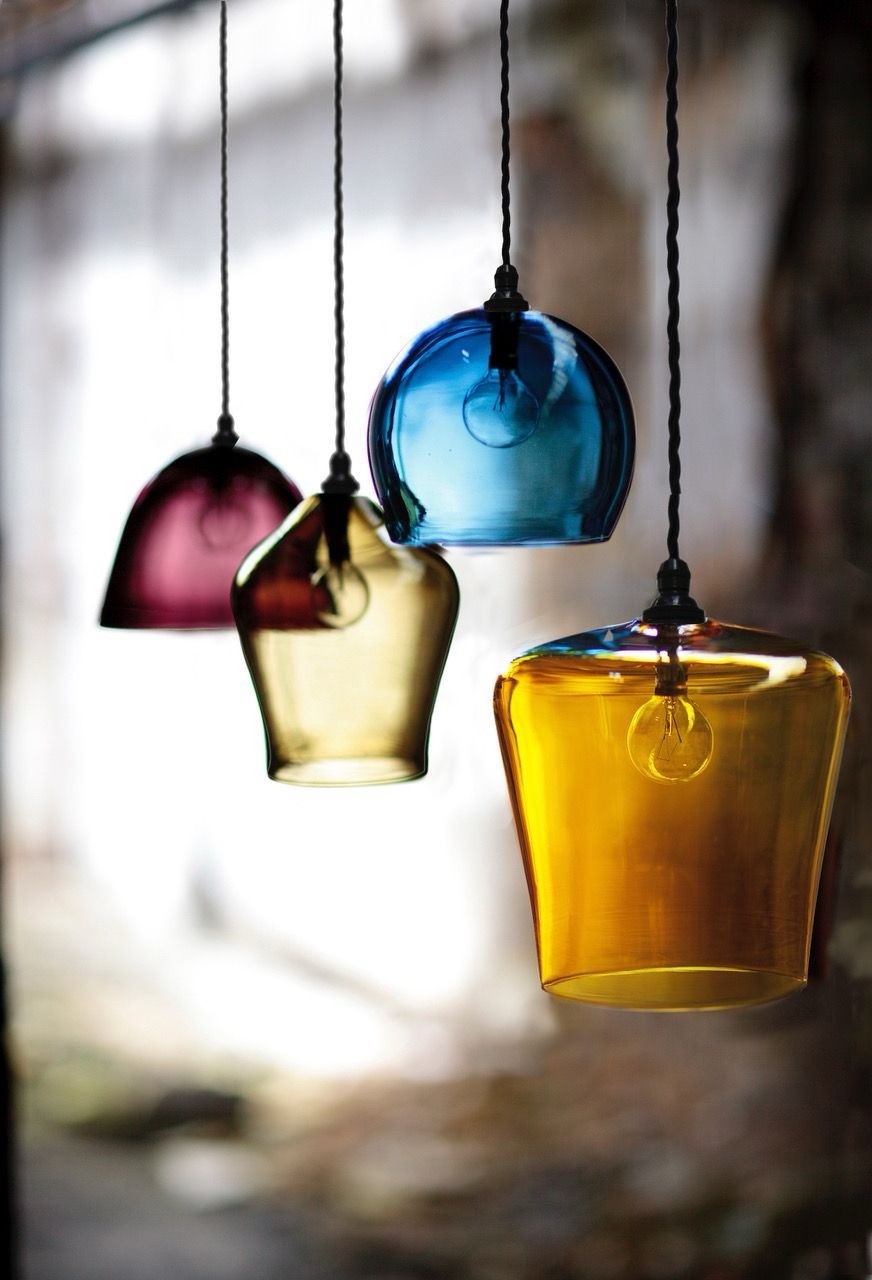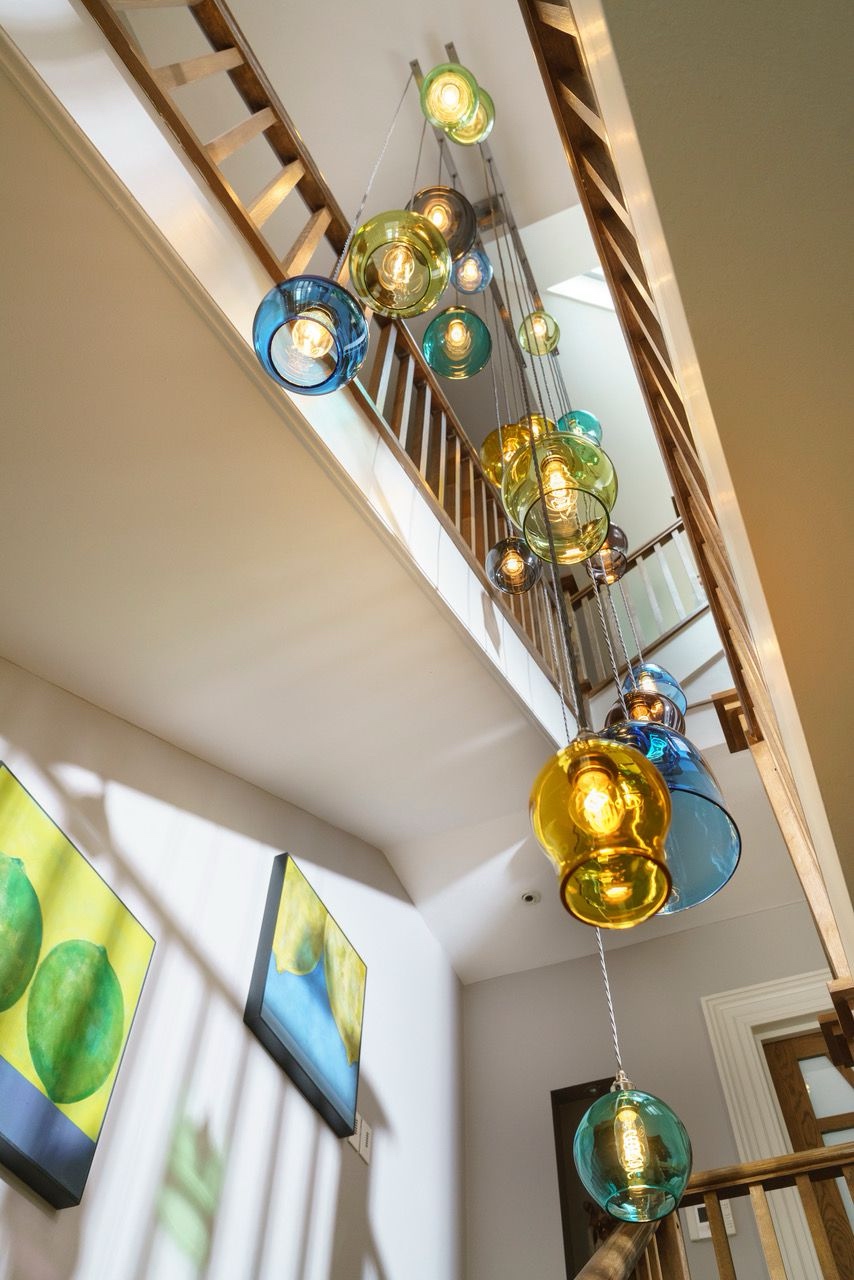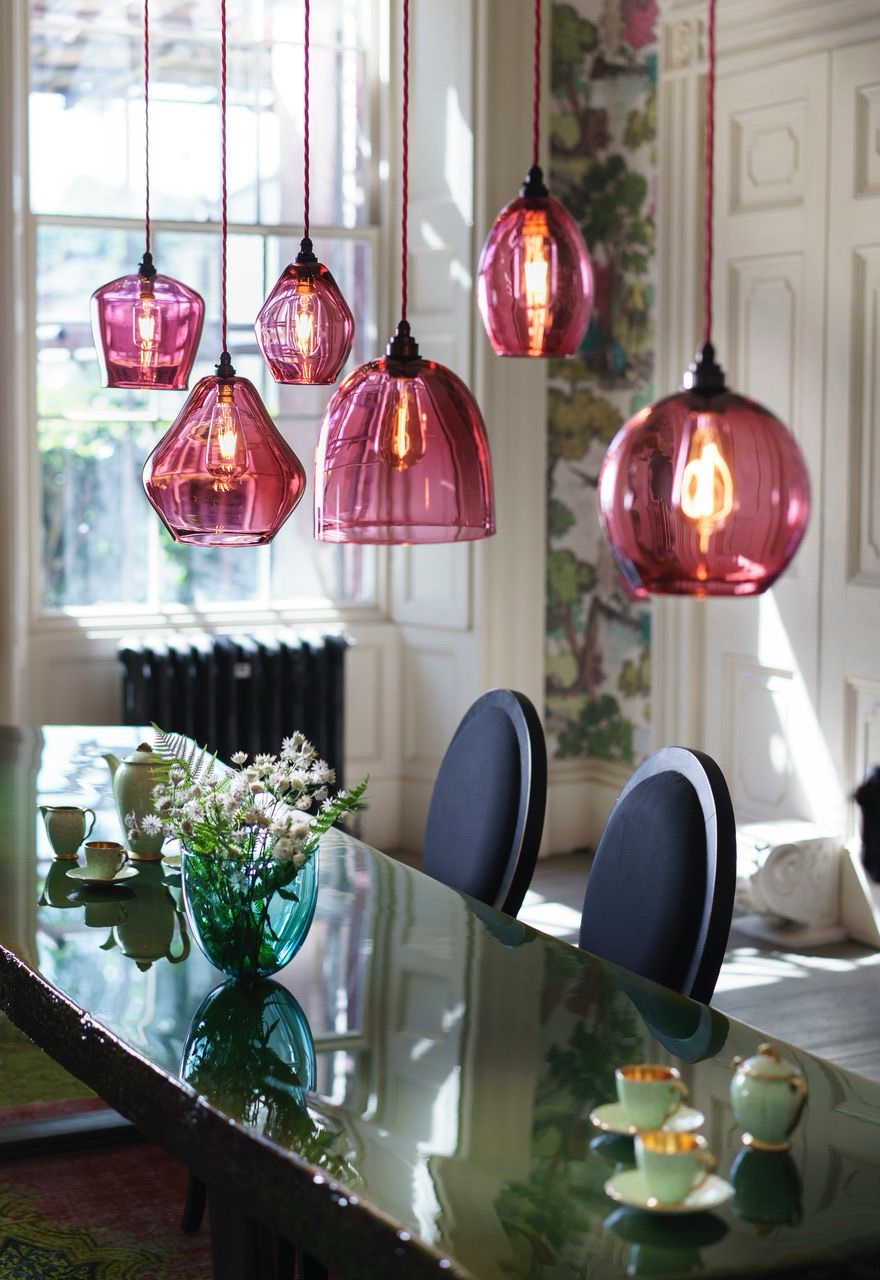Esther designs and sells bespoke glass lights through her company Curiousa & Curiousa, founded in 2010.
“Everything is blown to order - customers essentially commission a piece,” says her husband Paul, General Manager for Curiousa & Curiousa. “We have 24 colours and customers can have whatever size or shape they want. With free-blown glass, there’s no mould. Everything is formed by hand and tool, which makes every piece unique. It’s more challenging as you’re never sure what you’re going to get. There are swirls and bubbles within the glass that are all part of the process and testament to the glass blowers’ art.”
“Glass is a material that has such resonance and miraculous beauty,” says designer Esther Patterson. “To think you can create glass with heat, air and sand is spectacular.”

Crafting a business
Curiousa & Curiousa is the second business that Esther and Paul have managed as a pair. “We met as graphic designers back in the 80s and ran a graphic design company together,” says Paul. “In 2009, Esther went back to university as a mature student to study Decorative Arts at Nottingham Trent University - we had two kids so it was a bit of a stretch - but we managed. She set up the company the year after she graduated and only a year in, she had so many orders she had trouble keeping up and doing everything herself."
One of the key factors in her early success was the Designer Open Call at the London department store Liberty. After hours of queueing, laden with the glass and ceramic lights, fabrics and wallpaper she’d designed during her course, she set up a display of her work alongside the other designers. That day, she found her first retail partner - Liberty decided to sell some of her glass lights, designed by Esther and made by glass-blower Anthony Wassell.
“Anthony is a true master at glass blowing,” she says. “He can create the most amazing shapes and understands the drawings and ideas you give him. He’s fantastic to work with.” Anthony continues to work with Esther today, along with three two other glass-blowers and another five ten people who help with marketing, sales, production and dispatching orders.
“Esther met Anthony at university,” Paul explains. “For one of her modules, you could meet craftspeople and she ended up spending the afternoon with him. He had more than 40 years of experience - watching him work really sparked her imagination.”
The importance of marketing
Curiousa & Curiousa is a fusion of craftsmanship and entrepreneurship - it’s not enough to make beautiful products, you also have to know how to market them.
”Make your message clear,” says Esther. “Have a product you truly believe in but also fills a niche in the market. Always stay true to yourself so your brand message doesn’t get watered down.”
Photographs are also crucial. “Take the best images you can using a professional photographer - these will sell your product,” she says. “There’s one particular shot of four glass pendants set against each other that really helped build the brand,” adds Paul. “We still use it today, it’s such a strong image.” The image, pictured below, was taken by photographer Chris Webb.

Managing a team of craftspeople with Timetastic
Curiousa & Curiousa started using Timetastic to manage annual leave last month, although Paul has been familiar with us for several years. “I use Timetastic for another business we run, which is an independent cinema called The Northern Light. We only have six members of staff so it’s really good for the cinema,” he says. “The great thing about Timestastic is that it’s app-based but still human in scale.”
For Curiousa & Curiousa, employees receive 33 days of annual leave per year, or 35 days if they’ve been with the business for more than five years. “Everyone has the app, which is really useful at the moment with people working from home,” he says. “I like the little email at the beginning of the week telling me who’s on and who’s off and the overview of who has days still to book. It means I know who to chase to book time off.”
Like many workshops, Curiousa & Curiousa closes over the Christmas period. They also encourage four-day weeks and offer time in lieu for extra long days. “We have total trust in everyone,” he says. “If someone works a 12-hour day, they can take four hours off in lieu. Most of the staff are on 37.5 hour contracts, which they mostly do in four days instead of five.”
After furloughing staff in April for two months, the studio is now ramping back up again, processing the backlog of orders and taking on new commissions. “Until we know what the impact will be on sales, we’ve tightened our belts - for the foreseeable future, staff are on 80% salary so that we can protect everyone’s jobs,” he says.
Making a company ethical and sustainable
Looking after their people and our planet is at the heart of Curiousa & Curiousa, which has made a number of donations to Simple Life Farm in Germany, where they plant trees, shrubs and hedgerows to support local wildlife. “Esther is really passionate about the environmental impact of the company,” says Paul. “For a family holiday in Germany, we stayed at this organic B&B ran by Anna and Fiz, a really inspirational couple. What they’ve done in six years and the impact they’ve had directly on their environment with natural farming techniques is something we love to be able to support.”

Esther and Paul are also committed to minimising the carbon footprint of their production and sales: “We’ve looked at every aspect of how we work to see if we can make it more sustainable. We used our last piece of bubble wrap six months ago and we now use a paper alternative and soya fabric to wrap glass up.”
Curiousa & Curiousa is also looking into signing up to 1% for the Planet, inspired by our blog post on the process of becoming a member and donating 1% of our turnover to environmental charity Trees for Life. To find out more about Curiousa & Curiousa, have a look at its website or arrange a visit to its studio, housed in an old cotton mill in North Derbyshire.